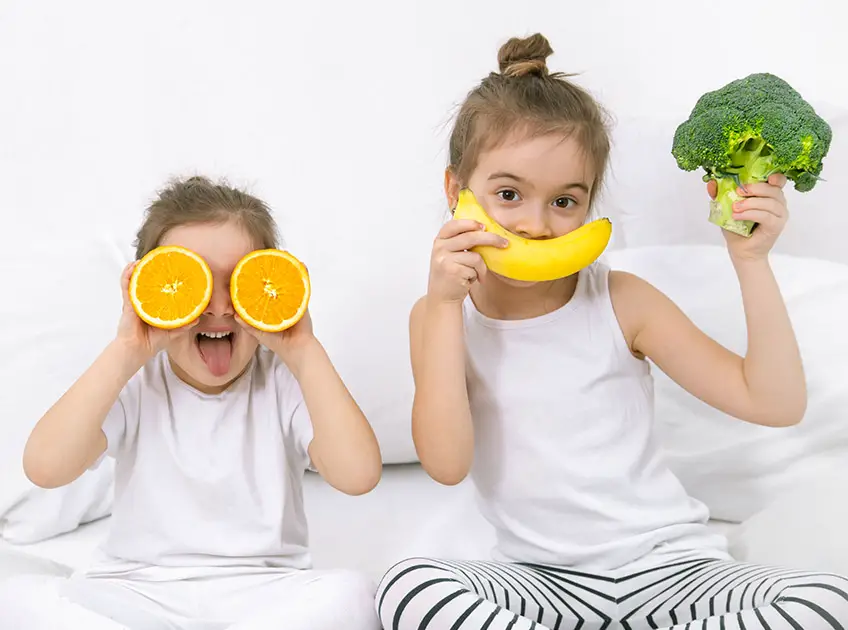
Important: This article is for informational purposes only. Please read our full disclaimer for more details.
Children need 25mg to 45mg vitamin C every day, depending on their age. When your child takes the vitamin in the right amount, it improves their immunity and propels their growth. Is your child getting adequate vitamin C every day? What would happen in the case of deficiency and how can you increase its consumption?
Why Should Your Child Take Vitamin C?
You should make sure that your child’s diet contains vitamin C because human bodies cannot produce this micronutrient endogenously (from within). Vitamin C, also known as ascorbic acid, is a water-soluble nutrient, which means that its excess quantity doesn’t stay in the body but gets washed out. This makes it necessary for the child to take it every day. The daily intake benefits the child in more ways than one. Let’s see what they are.
Benefits Of Vitamin C For Children

Vitamin C helps keep your child healthy and strong. Here are some of the ways it is useful:
- Heals wounds by helping in the formation of collagen
- Prevents infections because it is an efficient water-soluble antioxidant
- Maintains good bone structure again due to its support to the collagen
- The antioxidants and collagen formation properties help keep the skin healthy
- Supports protein metabolism
- Improves iron absorption by preventing the formation of insoluble and un absorbable iron compounds
- Added to the biosynthetic and antioxidant properties, vitamin C plays a crucial role in strengthening immunity.
[Read : TruSkin Vitamin C Serum]
Side-Effects Of Excess Vitamin C

The side effects of excess vitamin C are very rare and few cases have been reported so far. This is because the body flushes out the unused vitamin C content. Here are some problems your child can face due to the interaction of unabsorbed vitamin C in the gastrointestinal tract:
Sources Of Vitamin C
Vitamin C is found in different fruits and vegetables, such as:
- Citrus fruits such as oranges, lemons, and limes
- Blackcurrants
- Strawberries
- Kiwis
- Grapefruit
- Cabbage
- Spinach
- Green peas
- Green, yellow and red pepper
- Sprouts
- Tomatoes
- Baked potatoes
- Cantaloupe
- Broccoli
- Guava
Some other sources of vitamin C are cereals, bread, oats, noodles, rice, pasta, polenta, tofu, fish, lean meats, eggs, milk, cheese, and yogurt. Vitamin C is available in several foods and hence its deficiency is rare. However, it cannot be ruled out in children, who do not eat enough fruits and vegetables. Children who are exposed to cigarette smoke may also have a deficiency. If you are concerned that your child is not getting sufficient dose of vitamin C, check for any deficiency symptoms.
[Read : Mabox Vitamin C Serum Review]
Symptoms Of Vitamin C Deficiency
- Wounds take unusually long time to heal
- Inflammation of the gums
- Hyperkeratosis (abnormal thickening of the outer layer of the skin)
- Frequent cold and cough
- Feel fatigued
- Low immunity
- Dry hair with splits
- Dry and flaky skin
- Tooth enamel erosion
- Bleeding gums
- Bleeding nose
Prolonged deficiency of vitamin C can result in scurvy, but that is more common in adults than in children. If you suspect this deficiency in your child, take them to a doctor for a thorough diagnosis.
[Read : Dark Spots Oil Gone! SHVYOG Vitamin C Mask: Spa-Like Experience, Visible Results]
How Is Vitamin C Deficiency Diagnosed?
Diagnosis is usually done for individuals, who show gingival or skin signs.
- The doctor might recommend a blood test done to check the child’s vitamin C levels.
- An x-ray can help detect scurvy in children.
- Some academic centers measure the blood ascorbic acid in lab tests.
The doctor will suggest a treatment based on the results of the tests. But do not overfeed your child with vitamin C or give them supplements without consulting your doctor. If taken in excess, this micronutrient can have side-effects.
Vitamin C is one the most important micronutrients required for a child. The good thing is that it is adequately available in the foods, and these food sources are tasty to eat. Your child wouldn’t complain having them in their diet.
Related Articles
- Can You Mix Bakuchiol and Vitamin C Together
- Can I Use Glycolic Acid and Vitamin C Together?
- Epielle Vitamin C Facial Cleansing Facial Tissues Wipes Towelettes Review
- Essential Oils Vitamin C Facial Cleansing Wipes Review
- Eva Naturals Vitamin C Serum Review
- How to Use Hyaluronic Acid and Vitamin C Serum
- Vitamin C Vs Niacinamide – What’s The Difference?
- When to Use Vitamin C Serum Day or Night?
- Alpha Arbutin Vs. Vitamin C: What Happens If Used Together?
- Zero Calorie Foods – 26 Fruits & Vegetables to Lose Weight
- 10 Foods That Are High in Nucleic Acid
Image Credit: freepik















